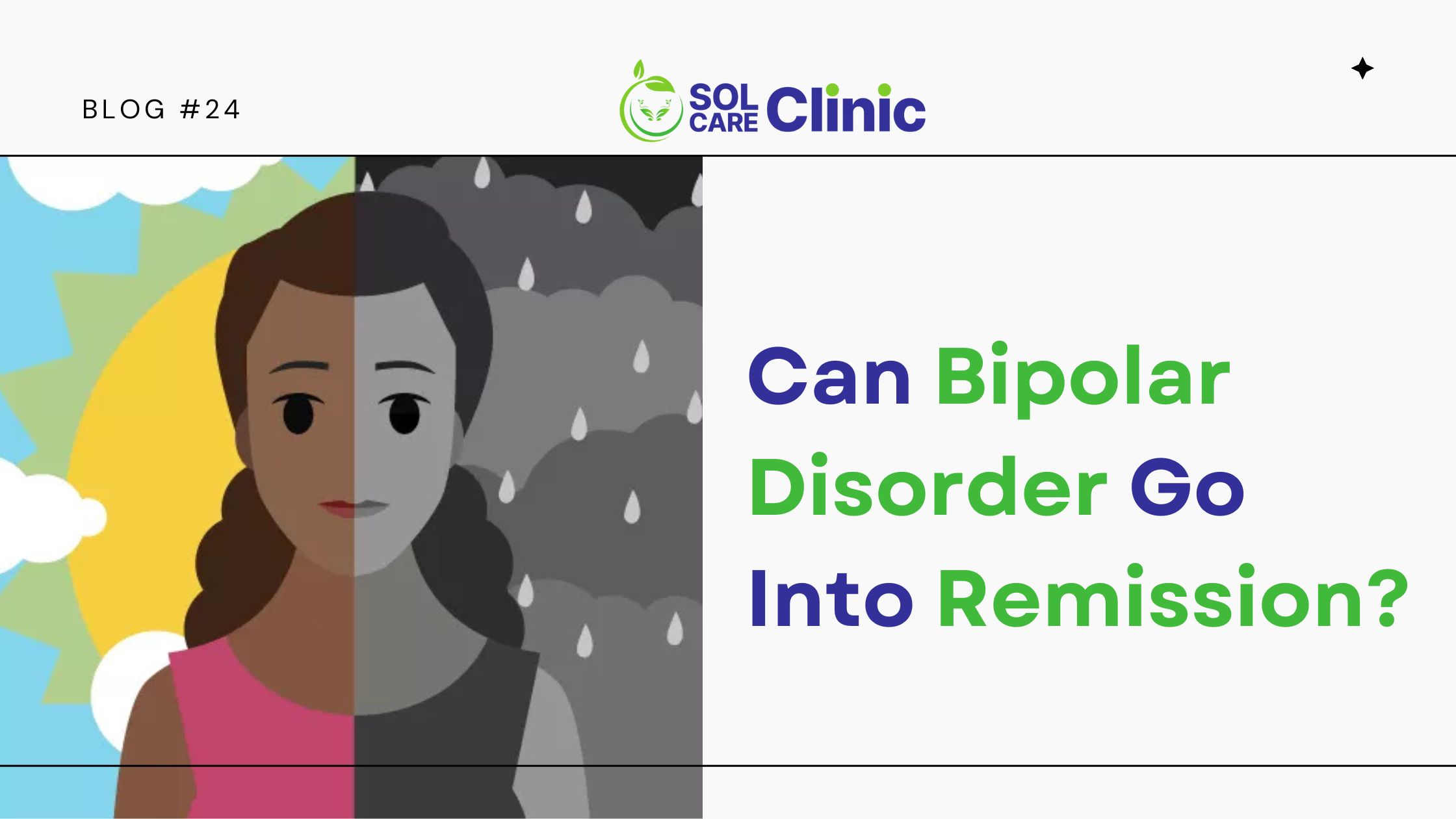We at SolCareClinic recognize that disorder is a complicated condition that impacts both the affected person and their family. The mania and depression that bipolar illness is characterized by can seriously interfere with a person’s life. One of the most common questions we encounter from our clients is whether it is possible for bipolar disorder to go into remission. While bipolar disorder is a lifelong condition, the good news is that remission is achievable with the right care and ongoing support.
We will define remission in the context of bipolar illness, go over potential treatment choices, and discuss how SolCareClinic may assist people in managing their condition for long-term stability in this article.
What Is Remission in Bipolar Disorder?
Remission in bipolar disorder refers to a significant reduction or even a disappearance of symptoms over a prolonged period. It is important to clarify that remission is not a cure, as bipolar disorder is a chronic condition. However, with appropriate treatment, many individuals can live stable, fulfilling lives without the frequent disruptions of mood swings.
Symptomatic vs. Functional Remission
There are two forms of remission that individuals with bipolar disorder can experience:
- Symptomatic Remission: This is when the individual no longer exhibits the symptoms needed to diagnose a manic or depressive episode. While the disorder remains, the symptoms are minimal or absent.
- Functional Remission: In functional reduction, side effects are controlled, permitting the person to have an ordinary existence, participating in connections, work, and social exercises without critical interference.
At SolCareClinic, we aim to help our patients not only reduce their symptoms but also regain full functionality in their daily lives through our tailored treatment plans.
How Common Is Remission in Bipolar Disorder?
Many of our clients at SolCareClinic have experienced long periods of stability with the right combination of treatment and support. Research suggests that 40% to 60% of individuals with bipolar disorder may achieve remission for at least a year or more. It’s important to note that while remission can last years for some, relapse is still possible, especially if the condition is not managed carefully.
Factors That Contribute to Bipolar Disorder Remission
We adopt an all-encompassing strategy to therapy, zeroing in on both clinical and way-of-life factors. Here are a few key components that add to accomplishing reduction:
- Timely Diagnosis and Treatment: Early mediation assumes a basic part in overseeing bipolar disorder. Our team works with clients to analyze the condition as soon as could be expected and offer quick help.
- Medication Adherence: Consistently taking prescribed medications such as mood stabilizers or antipsychotics is crucial for keeping mood swings under control. We monitor and adjust medications to ensure they are effective for each individual.
- Psychotherapy: Therapy is an essential component of managing bipolar disorder. We offer various forms of therapy, including Cognitive Behavioral Therapy (CBT) and Interpersonal and Social Rhythm Therapy (IPSRT), to help clients manage stressors and maintain stable routines.
- Lifestyle Support: Maintaining a healthy lifestyle with regular sleep, a balanced diet, and stress management techniques can significantly improve long-term outcomes. Our experts at SolCareClinic guide clients in making these lifestyle adjustments.
- Strong Support System: Having a reliable support network can greatly improve one’s ability to maintain remission.
How SolCareClinic Can Help You Achieve Remission
Our mission is to guide individuals toward long-term stability and remission. We offer a comprehensive range of services tailored to meet the unique needs of each client.
1. Personalized Medication Plans
Each person’s experience with bipolar disorder is different, and so are their treatment needs. Our psychiatrists work closely with clients to find the right combination of medications, whether it’s mood stabilizers, antipsychotics, or antidepressants. Regular follow-ups ensure that the treatment plan is adjusted as needed to maintain stability.
2. Therapy and Counseling
We provide evidence-based therapies that are proven to help individuals manage their bipolar disorder. Our therapy options include:
- Cognitive Behavioral Therapy (CBT): Helps clients understand and change negative thought patterns that can lead to episodes.
- Interpersonal and Social Rhythm Therapy (IPSRT): Focuses on maintaining consistent daily routines and addressing interpersonal challenges that may trigger mood swings.
- Family Therapy: Helps families understand bipolar disorder and creates a supportive home environment.
3. Comprehensive Lifestyle Support
We understand the importance of a healthy lifestyle in maintaining remission. Our team works with clients to create daily routines that promote mental well-being, including exercise plans, sleep hygiene, and stress reduction techniques. We also help individuals avoid common triggers like substance abuse and sleep disruption.
Preventing Relapse: How to Stay in Remission
Even during remission, proactive care is essential to prevent relapse. We equip our clients with the tools they need to stay in remission for as long as possible:
- Regular Check-Ins: Ongoing appointments with our psychiatrists ensure that medications are working effectively and any early signs of relapse are caught before they escalate.
- Mood Monitoring: We urge our clients to follow their temperaments and ways of behaving utilizing diaries or computerized instruments, permitting them to perceive examples and look for help before a relapse happens.
- Trigger Management: Our therapy sessions focus on identifying and managing triggers, such as stress or sleep deprivation, which can cause episodes to return.
- Crisis Planning: If symptoms start to reappear, having a plan in place, including how to adjust medications or seek emergency care, can prevent a full episode.
Final Verdict
Although bipolar illness is a lifetime diagnosis, with the correct care, remission is not only feasible but also achievable. We offer individualized care to assist people in taking back control of their lives. We are here to support you every step of the process, whether you need help maintaining remission, seeking treatment, or a diagnosis.
If you or a loved one is struggling with bipolar disorder, contact SolCareClinic today to schedule an appointment. Let us help you find the path to stability and a brighter future.





